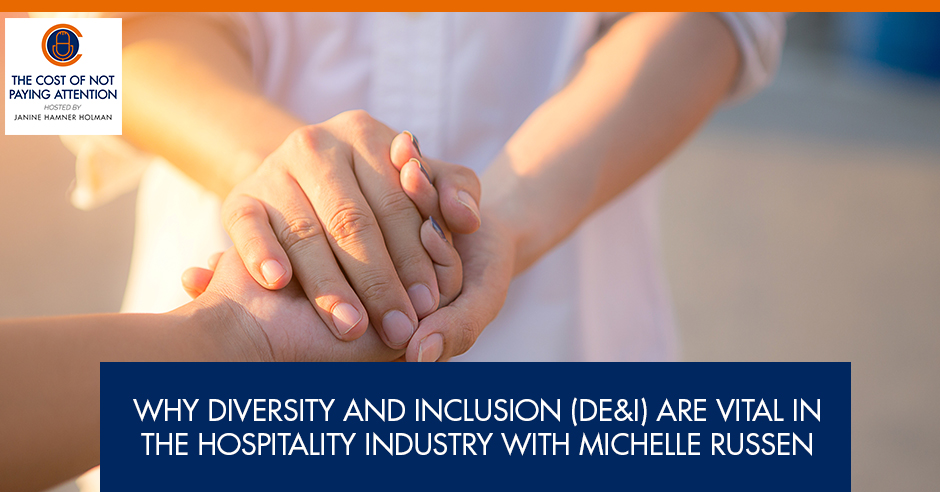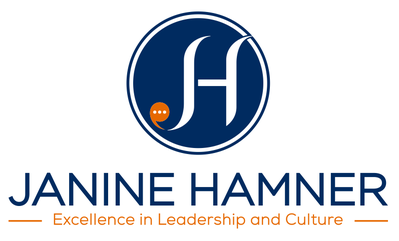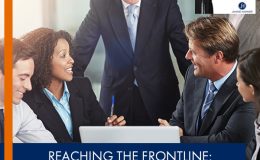
Psychological Safety is a critical piece in having everyone feel supported in the workplace and key to diversity, equity and inclusion (DE&I). Regardless of their gender, race, ethnicity, sexual orientation, age, abilities etc, our opportunity is to have everyone feel they belong. DE&I and psychological safety keynote speaker Janine Hamner Holman’s guest is Michelle Russen, a Ph.D. candidate whose research focuses on inclusivity. Janine and Michelle discuss why we need a fairer representation of women in leadership roles in the workplace in general and the hospitality industry in particular. All employees will feel they have someone to relate to with a more diverse representation. Join in the conversation to learn more!
HOST: Janine Hamner Holman | [email protected] | LinkedIn, Facebook, and Twitter | Subscribe to my Newsletter! Book me to Speak!
—
Listen to the podcast here:
Why Diversity And Inclusion (DE&I) Are Vital In The Hospitality Industry
A Conversation With Ph.D. Candidate Michelle Russen
What am I paying attention to? It’s inclusivity. It’s this wonderful word about how we include people as a default that regardless of who they are, as long as they’re not out to create harm. Just because of the fact that they’re human, they are working with us, collaborating with us, or in communication with us, they belong. They are included, which brings me right to my guest in this episode. Michelle Russen is a PhD candidate. She is getting her PhD in Hospitality Administration at Conrad Hilton College at the University of Houston. Her focus is on researching inclusivity and inclusiveness.
I met her through LinkedIn because there was a great article about the research that she’s doing, what she’s finding out about the power of gender, where we include people and where we don’t include people. She spent a lot of her career in the restaurant and hospitality industry and worked her way up in the industry. Along the way, she had an experience with some folks who are not being very inclusive. That experience propelled her to go on, get her PhD and start helping students and others who are going to be in administration in the future world of hospitality to think differently about how we include others in what we’re creating. Welcome, Michelle.
Companies are going to be missing out on potentially great candidates because they lack inclusivity. Share on XThank you very much. I’m so happy to be here.
I’m so happy to have you and that we got connected and that your team said that it would be great if you were the spokesperson around the research that you are doing. As we all know, in the world of research very little is done as one person. If we’re up to something big, we need other people with us. You, Michelle, are up to some big stuff. I’d like to begin as I begin most of my conversations: what’s something that you’ve become aware of that you or others weren’t paying attention to before? What’s been the cost of that not paying attention?
First, I started in the restaurant industry as a server when I was eighteen and I was working my way through college. As an employee, I wasn’t paying attention to who exactly my boss was because I was young. As I started to move up, I started to pay a lot more attention. I realized when I was in the management team, more often than not, I was the only woman sitting at the table. In the restaurant industry, we’re about 70% female in the entry-level positions. But we’re not being represented at the top because we have different experiences than what the men who were sitting at the table had. I was fortunate enough that they started to listen to me a little bit more. Once I was able, I tried to explain to them what the cost of not paying attention is: we’re losing these fantastic employees to go somewhere where they feel represented.
You are now at the University of Houston getting your PhD in inclusivity and also in gender. Tell us some about your research.
First, my dissertation, which is the broader picture, is looking at what we call the glass cliff. It’s looking at people who are not just women but identify as a gender minority and where these people are pushed out of management teams because they don’t fit society’s norm on “who should be a manager.” That led me to think, “Who decides on who’s getting promoted? These managers are. Let’s look at some fairness.” This is one of the research projects I completed, the one that you were able to find. I‘m so glad you did. This was about promotion fairness and looking at people in the hotel industry, which the experiment that I did with two of my dissertation advisors. What we were looking at was the accommodation segment, particularly hotels. Of the entire segment, 58% of the workers are female but only 12% are in leadership positions. It’s a big gap. We‘re like, “Something’s going on here.”
I came across another study that said men are offered 30% more management positions than women. I wanted to look at the fairness in the process. We found out that managers perceive it to be fairer when women are promoted over an equally qualified man. We start looking at why, which we would like to replicate the study again to confirm. What we think is because there’s a gap between the actual representation of women in the workforce compared to the women in leadership. It’s like, “We need to be fairer and have more representation of women so that way we can see that we’re represented from the bottom up and then they can also see that it has a culture that supports women.”
If you don’t think when you’re being hired on as a woman, that you’ll be supported, then you likely won’t even apply to that company in the first place. These other companies are going to be missing out on potentially great candidates because they’re lacking the inclusivity of wanting to support everyone, not just men, not just women but everybody.
It’s an important concept – that when we don’t see people who look like us in positions of leadership or think that we will be supported in an organization, we don’t even apply. I know that you have also been doing some work in the arena of diversity, equity, inclusion and belonging…as well as some of the other important words that have gotten included in the whole world of diversity. It’s one of the things that I do as well professionally is help organizations create an organizational culture or the ways of doing things inside of an organization that supports inclusivity, that support it being great for me, if for instance, I were a 7-foot tall black transgender woman. This is where we get into issues of unconscious bias, psychological safety, and what belonging and inclusion really look like.
I know that one of the things that you have discovered is that there are some gaps and places where we’re not paying so much attention. Tell me some more about that.
There are a lot of gaps because, however you identify as a gender, as race, ethnicity, no matter what, no two people are going to have exactly the same experience. We need to make sure that we’re able to have someone that everyone feels that they’re able to talk to, especially in management. If you don’t feel comfortable being able to talk to someone and sometimes that’s as simple as having another woman to talk to, then you won’t feel like you’re valued at that organization. It’s important for us to be able to provide more experiences that other people can relate to. Sometimes I’ll have an experience that’s more similar to what a gay man’s been through than what a straight man has or a gay woman might identify a little bit more with a male manager. It depends. We need to have someone for everyone. Even if it’s somebody else there in the organization too that’s a little bit like me that I can relate to, it’s going to create a more positive experience.

Diversity And Inclusion: However you identify as a gender, race, or ethnicity, no two people will have exactly the same experience.
There have been all of these studies that show that when we have “a friend at work“ that we are so much more engaged. In the work that you have done on inclusivity, have you noticed any things that are important or less important? I remember when I made a significant transition: I spent my first seventeen years working in nonprofit management and then I went to work for a Fortune 200 company. There were a lot of things that were different and there were so many things that were exactly the same. That was a part that surprised me: all the things that were exactly the same.
This idea kept coming up when I was working for a big Fortune 200 company about how important it was to have a friend at work. Originally, I thought that’s an interesting and odd frame that this company cares if I have a friend. And, it’s a friend at work, which can be different from your BFF. Those could have different qualities of relationship in them. I’m curious about what you have found about this concept of having people at work that are your friends, how that connects to inclusivity, how that connects in the research that you’re doing or what it is that you’re up to creating.
That’s one I was looking at for my dissertation. I know it seems like a trivial thing but it’s incredibly important for someone to have a friend at work. The reason why is because it increases your satisfaction and not just that, it increases your in-group representation. The in-group representation is when you have these people that are all in this one group. We can call them the popular group if you will. It’s not just them, the cool kids. As long as you have someone there who you can relate to and talk to, even if it’s about if you got a frustrating phone call from your kid’s school because your kid’s acting up or you got a text message from your boyfriend and he’s being all weird or whatever the case may be. To have someone to vent to for half a second releases stress and tension. One of the thoughts is that people who don’t have that at work get pushed out because people see them as an outsider. They get pushed out of their work environment. In order to be inclusive, you have to have a friend at work. That’s where it comes from.
I don’t expect you to have an answer to this next one and I’m curious if you have thoughts. The next thing that comes up for me is how do we ensure that everybody gets to have a friend at work? How do we ensure that we’re setting up the conditions that would be great for all people? I was talking to a client the other day and they feel like they’re not making enough time inside their organization because we’re all virtual. All of those little conversations that would happen throughout the day aren’t happening. How do you ensure that people have enough of that casual contact where friendships get made?
I don’t know if I have the perfect answer for this.
If you don’t have the perfect answer for this, put it in the chat for the show, blog about it or do a TED Talk on it. This is a big question. I’m not looking for you to have the perfect answer to it, Michelle. I’m curious about what thoughts you have about it.
It's important for us to be able to provide more experiences that other people can relate to. Share on XI do have a thought. I’ve read some papers on mentorships. People feel as though they are more welcome, included and can create more natural relationships through informal mentorships than from new ones. Formal is still better than having no mentorship program.
So, it’s great to have a mentor and it’s better if it’s an informal mentor. The hierarchy might go like an informal mentor: best; formal mentor in the middle; and then no mentorship: worse.
It can be across gender identities or races or experiences. It doesn’t matter. One way that we can improve the mentorship program would be to match people, have everyone take a questionnaire when they’re getting hired about what their interests are. If you can match people on like, “I love football and you love football. We’re matched together,” that can create some small thing that we can talk about.
Often in a work situation, they’re going to formally set up a mentorship between you and me because you know a lot about the hospitality industry and I know bupkis about the hospitality industry. You’re going to get to be my mentor and move me along in the industry. What you’re saying is that it’s so much better if it’s something that has nothing to do with work?
Yes, because whether you know a lot about the work environment or little, you can still learn from someone who’s good at their job and you’re going to learn better if you can be at ease. Even if we both have toddlers, then you can talk about that. Something small that you have in common, it’s going to be a lot easier to have a natural friendship that way.
I should be looking for people who love scuba diving. That’s so interesting.
I can set you up with my friend Courtney. She loves to scuba dive too.
Scuba diving is one of those things that I came to, relatively speaking, late in life. I got certified to dive on my 40th birthday. It’s become a big passion and something I’ve fallen out of recently so I’m looking for some new scuba buddies so I can do that and travel again!
Michelle, if you had a magic wand and you could have people pay attention to one thing, either what we’ve been talking about or something else, what would that be? What would your big microphone be?
It’s going to be along the lines of a social movement here. It’s been a passion of mine since before the social movement of #BLM or #MeToo. We need to pay attention to what’s going on within our own organizations and make sure everybody feels that they’re being treated fairly, not discriminated against, and that they’re not in a quid pro quo situation. They need to feel as though they’re making a difference at the organization, not that they’re being manipulated to do so.
One of the things that I often work with organizations around is how can we, as an organization, be a mission-driven organization. If what we’re up to is serving people food in a restaurant or having them have a place to lay their weary heads in a hotel, what’s the experience that we want people to have? What’s our bigger purpose? If I am sweeping the floor, I’m bringing them food, I’m making the bed, I’m greeting them at the desk as they walk in, or I’m answering the phone, what are those things that I get to be grounded in – what are we about?
What are we creating that I can also embrace as my purpose? I know for folks of your generation, the Millennials and the Gen Zs coming after you, feeling like your work has a purpose and feeling like you’re in it for something different than just a paycheck is so critical. Do you have any tips, tricks or thoughts about that? If there are readers out there who are like, “That sounds like a great idea. How the heck do I get started with that?” What’s anything that someone could do to get started?

Diversity And Inclusion: We need to pay attention to what’s going on within our own organization and make sure everybody feels that they’re being treated fairly, not discriminated against.
When I teach human resource management, the first thing I tell my students is it starts at the top. At the top, you have to buy into it. If you as the top management team, you as the owner and you don’t buy into your own mission or you don’t have a clear enough one, that’s going to be where it starts. Once you have a clear enough mission and you’re passionate about it, it’s easy to get other people passionate about it. As long as you buy into your mission, it will be easy to get other people motivated if you can explain why.
That gets to Simon Sinek’s terrific book Start With Why. If you haven’t read it, pick up a copy. I completely agree that it starts at the top. What if you’re not at the top? What if you are just a regular frontline employee and the top doesn’t seem that interested in that? It occurs to me that while it would be less awesome, as a frontline person I could decide “what we are up to and how am I going to create that as something bigger than myself so that I get those things that I’m excited about and create purpose for myself?” If this damn organization isn’t going to do it, I’m going to do it. Can that work?
Yes. It depends on if it’s that important to you. You can even create change in your own organization if you want to. It starts with why. What’s important to you and why? How are you going to show that to other people, to guests and to other employees? Think about how. If you start with, “This is important to me so I’m going to act this way every day. I‘m going to act ethically every day with the best standards and with the best morals,” other people will feed off that energy. It’s a lot more difficult to do it that way – from the bottom up – but it can be done.
So, if I‘m a hotel worker and I decide, “I want to make sure that our guests have a five-star experience even if we’re only a two-star hotel.” I start showing up in a way that has guests having a five-star experience!
I remember the first vacation my now-husband then-boyfriend and I took was to Jamaica. We were not staying at a five-star hotel. It was a family-owned business but they treated everybody, guests, other employees, like we were all family and the good kind of family. You’re like, “This is super fun hanging out with you all.” It was a joyful experience. I think about that. I’m sure that it was one of those things that came from the top.
I would think that if I was a frontline employee and I started showing up that way, I’d be getting lots of good reviews from guests and it would start to rub off on other people.
It does. When I was the assistant general manager at the restaurant, we empowered our employees, especially those who interacted with guests to do what they needed to do to make the guests happy. I had a couple of servers that grabbed onto that and loved every second of it but also let our servers be individualistic. However they wanted to greet the table, they were allowed to as long as you went through these five steps. I don’t care how you get through them. You do them your way but we need to make sure that this happens.
I had two servers who would be requested by name every single day on every single shift because people loved them so much. It came naturally to them. It was something that they wanted to live by. They did a personal touch for every single table. They would get to know their regulars and ask about their kids, their pets and everything else. That was the way that they wanted to run it. I guarantee you, if I pulled up that website, they would have some awesome comments by name.
I’m thinking about the restaurant that’s my husband’s favorite restaurant, which is an expensive restaurant. We don’t often go – like his birthday and sometimes anniversaries. We have a favorite server at that restaurant. We ask for her by name. She knows our kids. We’re friends on Facebook. It’s his birthday, so I’m paying the tab. I leave her a $100 tip. It’s an expensive restaurant. We’ve dropped some money but that’s still a good tip. We often will buy her a glass of wine or give her a glass of wine of the bottle that we’re drinking. We have this feeling of connection with her, which is back to that inclusivity and friend at work. When you feel connected to people in whatever it is that you’re up to, you have a different level of investment. It comes through in your performance. It comes through in your engagement. Customers and other people tend to notice it.
They do. In my first lecture of the semester, I started out with, “Why is human resource management important?” People are staring at me like, “What?”
That’s a great question. Why is it important?
Think about it. Have you ever walked into a restaurant and you get a good feeling? I’m sure you have. You can tell the difference between good human resource management versus bad. That feeling that you get in a restaurant where you feel the love that’s there between the employees projected to you, that’s what good human resource management does and that’s why we need to know it.
The more that we can be inclusive, welcoming and create the conditions where it’s awesome for everybody to show up as who they are. I grew up in the ‘70s and started working in the ‘80s. At that point in time (and for a long time before that), there was this weird idea that we were one person at home and somebody else at work. One of the things that I think is so great that has happened over the last years is that there’s become this understanding that we can’t check ourselves at the door. We are who we are. The more that we can show up authentically, the more that we can show up as our best selves, as our most open, as our most engaging, as our most authentic, as our most charismatic, as our most enthusiastic, that’s when we get the best results from people.
That’s when organizations work well. That’s when organizations are the most resilient. That’s when they’re the most agile. That’s when they’re the most profitable when they’ve got the best ability to retain and recruit top talent. I love it that this is where you’re putting your energy, your focus and helping the world of work, in particular, the world of hospitality understand better about the importance of inclusivity. We’re getting to the end of our time together. Is there one last thing where you would love to leave people? Is there one last thought, idea, concept or something where you would love to leave people?
Love the person you are and love other people for who they are. Share on XMy final thoughts are to love the person you are and love other people for who they are. If you can love yourself for who you are, you can love anybody else for who they are. Keep that in mind no matter where you are, whether that’s at work, at home, in the grocery store fighting for toilet paper. It’s not hard to love each other. Let’s do that.
I love you. Thank you, Michelle. Thank you for your brilliance, insights and the work that you’re doing. Thank you for helping to transform the hospitality industry. It has been a joy getting to know you and having an opportunity to interact with you.
Thank you so much for having me. I appreciate it. It’s been fun.
You’re so welcome. Remember, great leaders, make great teams. Until next time.
Important Links:
- Michelle Russen – LinkedIn
- Study – Hotels that Promote Women Perceived as Fairer, Less Discriminatory
- Start With Why
About Michelle Russen
 Before deciding to pursue my Ph.D., I spent 10 years in the restaurant industry. I started as a server for an independent restaurant in Florida when I moved there for college. As I spent more time in the restaurant, I decided I loved it and turned it into a career. After graduating with my Bachelor’s in Hospitality Administration, I took a job as an assistant bar manager in a new restaurant.Over the next four years, I worked my way up until I was finally the Assistant General Manager. As much as I loved my job, I realized there was not much left for me to learn in the restaurant business and there were additional challenges being a woman manager in the field, so I decided to go back to school for my Master’s degree. I continued working at that restaurant until I moved to Houston for my next step: a Ph.D.I have loved the idea of being a professor since my first semester in college, and now I am making that dream come true.
Before deciding to pursue my Ph.D., I spent 10 years in the restaurant industry. I started as a server for an independent restaurant in Florida when I moved there for college. As I spent more time in the restaurant, I decided I loved it and turned it into a career. After graduating with my Bachelor’s in Hospitality Administration, I took a job as an assistant bar manager in a new restaurant.Over the next four years, I worked my way up until I was finally the Assistant General Manager. As much as I loved my job, I realized there was not much left for me to learn in the restaurant business and there were additional challenges being a woman manager in the field, so I decided to go back to school for my Master’s degree. I continued working at that restaurant until I moved to Houston for my next step: a Ph.D.I have loved the idea of being a professor since my first semester in college, and now I am making that dream come true.
My research (a large aspect of being a professor) focuses on diversity and inclusion; to allow other women and minorities to not have to face the same challenges, stigmas, and inequities I faced when I was in the industry. I hope to make a positive impact on not only the restaurant industry and hospitality, but on businesses in every industry.




